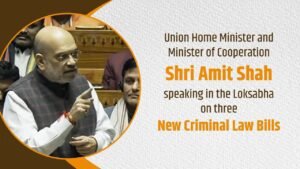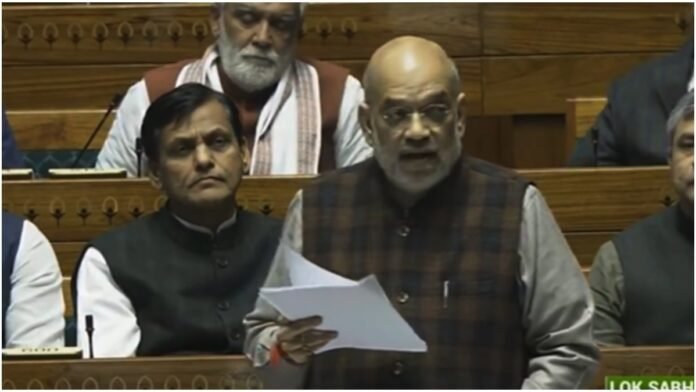Three new laws for punishing criminals were passed in the Lok Sabha, even though 97 members of parliament were not allowed to participate.
2 min read 2023-12-20, 10:30 PM IST
Summary of the content
- Landmark Legislation: Lok Sabha passed Bharatiya Nyaya Sanhita, replacing key criminal laws, driven by Union Home Minister Amit Shah’s vision for a justice-centric approach aligned with Indian values.
- Addressing Challenges: The laws aim to address challenges in justice access for the underprivileged, providing clarity, expediency, and a departure from colonial influences.
- Key Reforms: Sedition removed, “offences against the state” introduced, and a framework for terrorism established. Controversially, the death penalty for mob lynching included.
- Historic Moment: Passage through Lok Sabha signifies a historic shift, breaking away from colonial legal structures and indigenizing the justice system.
- Next Steps: The legislation now faces scrutiny in the Upper House, where debates will unfold on specific clauses and the broader vision for India’s criminal justice system.

The Lok Sabha, on a consequential Wednesday session, resolutely ushered in a new era of criminal justice reform by approving three landmark bills designed to overhaul the existing legal framework. The primary objective of these bills, collectively known as Bharatiya Nyaya Sanhita, is to modernize the country’s criminal justice system, infusing it with principles deeply rooted in Indian values. The triad of legislative changes comprises Bharatiya Nyaya Sanhita, aimed at replacing the age-old Indian Penal Code, Bharatiya Nagarik Suraksha Sanhita, seeking to supersede the Code of Criminal Procedure, and Bharatiya Sakshya Sanhita, intended to substitute the Indian Evidence Act.
This monumental shift in legal architecture didn’t unfold without its share of controversy. However, despite the dissenting voices and a notable absence of 97 Members of Parliament, who had been suspended earlier in the week, the Lower House resolutely greenlit these bills. The driving force behind this legislative overhaul was none other than Amit Shah, the Union Home Minister, who not only presented the bills but also passionately critiqued the prevailing criminal laws for their colonial origins, asserting that they tilted towards punitive measures rather than a justice-centric approach.
ALSO READ: Security Breach and Smoke Bombs on 22nd Anniversary of Parliament Attack.
At the heart of this legal transformation lies the Bharatiya Nyaya (Second) Sanhita, 2023. This comprehensive legislation seeks to supplant the Indian Penal Code, pivoting towards a justice-oriented system in stark contrast to the existing paradigm. Minister Amit Shah, in his impassioned address to the Lok Sabha, underscored the imperative to align the legal framework with the ethos of the Constitution. His fervent belief is that the new laws aren’t just a set of statutes but rather a profound attempt to establish a justice system deeply rooted in Indian ideologies, untethered from the lingering influences of colonial rule.
The passage of these bills through the Lok Sabha, facilitated by a voice vote, marked a pivotal moment in the country’s legal history. Amit Shah, while defending these changes, shed light on the challenges faced by the underprivileged in accessing justice. Financial constraints and protracted delays within the judicial system have historically hampered the delivery of justice to those who need it most. The proposed laws, according to Shah, are a concerted effort to address these issues by providing much-needed clarity and expediency in legal proceedings.
One of the most significant departures from the existing legal framework is the elimination of sedition as a distinct crime. In its place, the proposed legislation introduces a section on “offences against the state,” providing a nuanced approach to crimes that threaten the very fabric of the nation. Simultaneously, the bills lay out a well-defined framework for dealing with terrorism, recognizing the evolving nature of such threats in the contemporary world.
Perhaps one of the most debated aspects of the proposed laws is the introduction of the death penalty for mob lynching. This particular provision has been a subject of intense scrutiny and discussion since its inception. Originally introduced during the Monsoon Session of Parliament, the bills faced considerable opposition, leading to their withdrawal. However, undeterred by the initial setback, Amit Shah reintroduced the revised bills in the Lok Sabha, and this time around, they successfully navigated the legislative process.
The decision to incorporate the death penalty for mob lynching reflects a broader commitment to addressing a grave social concern that has plagued the country. Mob violence, often fueled by communal tensions or false rumors, has claimed numerous lives, and the legislative intent behind this provision is to send a strong deterrent message. Advocates of the provision argue that it serves as a necessary and proportionate response to the heinous nature of mob lynching incidents.
In the broader context, these legislative changes represent a paradigm shift from the inherited legal structures that have governed the country since its colonial past. Amit Shah, in his role as the torchbearer of this reform, has consistently emphasized the need to break free from the shackles of colonial influences. The laws, as they stand now, are a testament to a conscious effort to indigenize the justice system, making it more attuned to the cultural, social, and ethical values that define the nation.
While the bills have secured passage in the Lok Sabha, their journey is far from over. The Upper House awaits, and there, the fate of these transformative legal measures will face further scrutiny and deliberation. The controversy surrounding certain provisions, especially the death penalty for mob lynching, is likely to intensify during these discussions. The debate will not only be about the specific clauses of the legislation but also about the broader vision they embody for the future of India’s criminal justice system.
In conclusion, the passage of the Bharatiya Nyaya Sanhita bills in the Lok Sabha signifies a historic moment in India‘s legal evolution. It reflects a conscious effort to shed the vestiges of colonial-era legal thinking and embrace a justice system that is not just punitive but, more importantly, rooted in the principles and values that define the nation. As the bills move to the Upper House, the nation watches with bated breath, awaiting the next chapter in the ongoing saga of legal reform.

